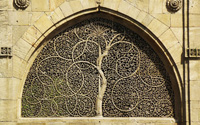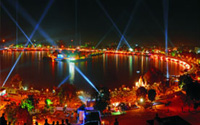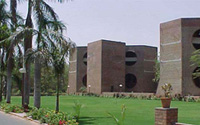Attraction in Ahmedabad
Ahmedabad, the city of Ahmed Shah (Medieval ruler of Gujarat), is known for its rich past and its association with the Mohandas Karamchand Gandhi, also known as Mahatma Gandhi. The city offers a unique style of architecture which is a blend of Hindu and Islamic styles. The monuments of Ahmedabad date back to the 15th century. Ahmedabad has been known for its industry since medieval times. Presently, it is famous for its textile mills and is often referred to as ‘Manchester of the East’.
Sidi Saiyyed Mosque
 The Sidi Saiyyed Mosque, built in 1573, is one of the most famous mosques of Ahmedabad. The mosque was built by Sidi Saiyyed, who was a slave of Sultan Ahmed Shah. The mosque was built in the last year of the Sultanate of Gujarat. The mosque is entirely arcuated. The mosque has ten screen windows (Jalis) on the sides and rear arches. This fact is disclosed by an inscription which has been fitted in the interior of the mosque. The rear wall is filled with square stone pierced panels in geometrical designs. The two bays flanking the central aisle have reticulated stone slabs carved in designs of intertwined trees and foliage and a palm motif. This intricately carved stone window is called the Sidi Saiyyed Jali. This jali inspired the design of the logo of the Indian Institute of Management, Ahmedabad.
The Sidi Saiyyed Mosque, built in 1573, is one of the most famous mosques of Ahmedabad. The mosque was built by Sidi Saiyyed, who was a slave of Sultan Ahmed Shah. The mosque was built in the last year of the Sultanate of Gujarat. The mosque is entirely arcuated. The mosque has ten screen windows (Jalis) on the sides and rear arches. This fact is disclosed by an inscription which has been fitted in the interior of the mosque. The rear wall is filled with square stone pierced panels in geometrical designs. The two bays flanking the central aisle have reticulated stone slabs carved in designs of intertwined trees and foliage and a palm motif. This intricately carved stone window is called the Sidi Saiyyed Jali. This jali inspired the design of the logo of the Indian Institute of Management, Ahmedabad.
Gandhi Ashram, Sabarmati
 The ashram was originally established at the Kocharab Bungalow of Jivanlal Desai on 25 May 1915. The Ashram was then shifted on 17 June 1917 to a piece of open land on the bank of the river Sabarmati because Gandhiji wanted to do some experiments in living for which he was in search of this kind of barren land. It was believed that this was ancient ashram site of Dadhichi Rishi who had donated his bones for a righteous war but his actual ashram lies in Naimisharanya, near Lucknow. Mahatama Gandhi said, “This is the right place for our activities to carry on the search for truth and develop fearlessness, for on one side are the iron bolts of the foreigners and on the other, the thunderbolts of Mother Nature.”
The ashram was originally established at the Kocharab Bungalow of Jivanlal Desai on 25 May 1915. The Ashram was then shifted on 17 June 1917 to a piece of open land on the bank of the river Sabarmati because Gandhiji wanted to do some experiments in living for which he was in search of this kind of barren land. It was believed that this was ancient ashram site of Dadhichi Rishi who had donated his bones for a righteous war but his actual ashram lies in Naimisharanya, near Lucknow. Mahatama Gandhi said, “This is the right place for our activities to carry on the search for truth and develop fearlessness, for on one side are the iron bolts of the foreigners and on the other, the thunderbolts of Mother Nature.”
Kankaria Lake
 Kankaria is the biggest lake of the city of Ahmedabad. It was built by Sultan Kutubuddin in 15th century A.D. The work was completed in 1451. Its ancient name is Hauj-E-Kutub. It also had a water purification system but it is lost with the time. At one point of the circular lake, there opens a walkway which later merges into a garden called Nagina Wadi (means a beautiful garden in Urdu) that is located in the center of the lake. There is also a gym in the Kankaria Lake campus which is called Ambubhai Vyayamshala. The central garden and the walkway has recently been revamped.
Kankaria is the biggest lake of the city of Ahmedabad. It was built by Sultan Kutubuddin in 15th century A.D. The work was completed in 1451. Its ancient name is Hauj-E-Kutub. It also had a water purification system but it is lost with the time. At one point of the circular lake, there opens a walkway which later merges into a garden called Nagina Wadi (means a beautiful garden in Urdu) that is located in the center of the lake. There is also a gym in the Kankaria Lake campus which is called Ambubhai Vyayamshala. The central garden and the walkway has recently been revamped.
Indian Institute of Management (IIM), Ahmedabad
 The Indian Institute of Management, Ahmedabad, better known as IIM Ahmedabad or simply IIMA, is a management institute located in Ahmedabad, Gujarat. It is considered to be one of the premier institutes of management in India. According to the Economists’ survey of global business schools in 2009, IIMA is considered to be the “toughest in the world to get into”as over 600 people compete for every seat. IIMA was ranked as the top business school in India according to the Business Today B-School Rankings in 2007-08 and the Economic Times B-school Survey 2007. The Center for Forecasting & Research ranked IIMA as India’s top business school in 2009. IIMA has European Quality Improvement System accreditation.
The Indian Institute of Management, Ahmedabad, better known as IIM Ahmedabad or simply IIMA, is a management institute located in Ahmedabad, Gujarat. It is considered to be one of the premier institutes of management in India. According to the Economists’ survey of global business schools in 2009, IIMA is considered to be the “toughest in the world to get into”as over 600 people compete for every seat. IIMA was ranked as the top business school in India according to the Business Today B-School Rankings in 2007-08 and the Economic Times B-school Survey 2007. The Center for Forecasting & Research ranked IIMA as India’s top business school in 2009. IIMA has European Quality Improvement System accreditation.
Akshardham (Gandhinagar)
 Akshardham is one of the largest temples of Gujarat. The temple complex combines devotions, art, architecture, education, exhibitions and research at one place. The temple came to international attention when two heavily armed terrorists attacked it in September 2002.
Akshardham is one of the largest temples of Gujarat. The temple complex combines devotions, art, architecture, education, exhibitions and research at one place. The temple came to international attention when two heavily armed terrorists attacked it in September 2002.



